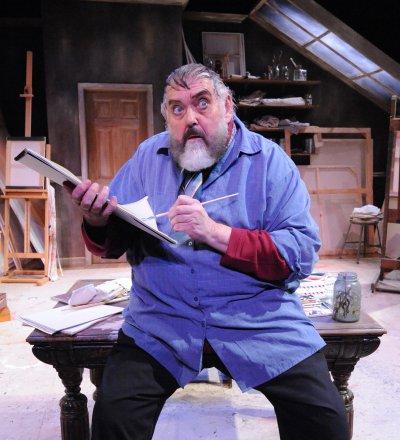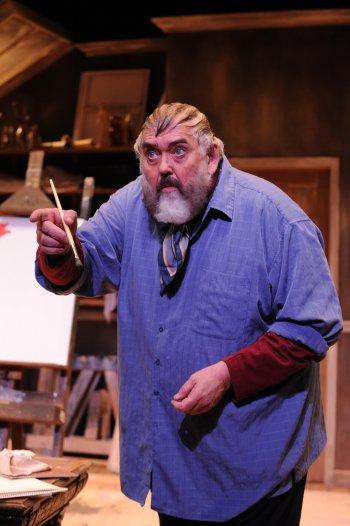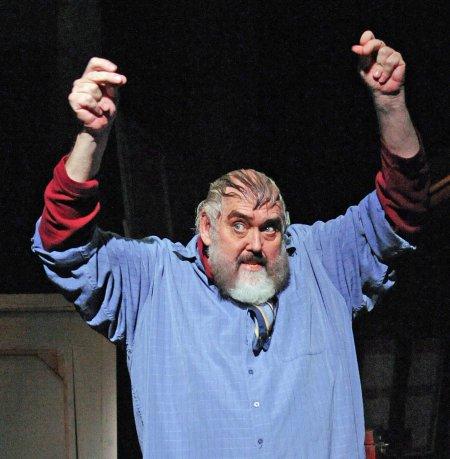Zero Hour
Zero Mostel is brilliantly brought to life by Jim Brochu’s superb performance and his fine writing in this return engagement of the acclaimed solo play.

Jim Brochu in a scene from “Zero Hour” (Photo credit: Stan Barouh)
[avatar user=”Darryl Reilly” size=”96″ align=”left” ] Darryl Reilly, Critic[/avatar]“I’m forever going to be known as ‘the fat guy from The Producers.’”
Thanks to Jim Brochu’s superb performance in and detailed writing of the solo play Zero Hour; Zero Mostel will be known for much more than that.
With his back to the audience while at an easel, Mr. Brochu is speaking to an unseen New York Times writer at the play’s start. Then he turns around and it’s a revelation.
Bearded, stocky and with that distinctive, wild comb-over of salt and pepper hair and wearing an artist’s smock, Brochu vividly conveys the visual, vocal and personality characteristics of the Broadway legend. For 90 enthralling minutes, he dramatizes and enacts the remarkable life and career of that unforgettable performer.
The straightforward and clever conceit is that we are at Mostel’s painting studio on 28th Street in Manhattan. It is July of 1977, and Mostel is being interviewed shortly before rehearsals for his latest Broadway play, The Merchant, an adaptation of Shakespeare’s The Merchant of Venice are about to begin. That September during the show’s Philadelphia tryout, Mostel died at the age of 62.
Exhibiting commanding physicality and replicating Mostel’s trademark bellowing delivery, Brochu tells jokes, sings, and captures the gargantuan essence of the man. His sensational acting is matched by his heavily researched and very skillfully constructed script.

Jim Brochu in a scene from “Zero Hour” (Photo credit: Stan Barouh)
“From The Blacklist to The White House in ten years,” sums up the trajectory of Mostel’s career. He was born and raised in poverty in Brooklyn to immigrant Orthodox Jews in 1915. He displayed artistic talents in childhood.
Through several flukes he became a celebrated nightclub comic performer. “I only did comedy to buy more paint. I was a painter!” A grand highlight of the show is Brochu recreating Mostel’s 1942 act, where among other things he did a bit as a butterfly.
This led to a Hollywood movie contract, Broadway shows and television appearances. It all crashed in the 1950’s, when like so many performers, he was blacklisted for his liberal views and by probable anti-Semitism. He scrabbled on, and eventually there were his three 1960’s Tony Award-winning roles in Rhinoceros, A Funny Thing Happened on the Way to the Forum, and Fiddler on the Roof.
Show business often brings enemies together. He had to work with director and choreographer Jerome Robbins on A Funny Thing Happened on the Way to the Forum and Fiddler on the Roof. Robbins had cooperated with the House Un-American Activities Committee. His career thrived while Mostel’s was ruined for not cooperating.
Fiddler on The Roof led to his being invited to a state dinner given by President Lyndon Johnson. That show also had a coincidental personal conflict. He visited his estranged, dying mother with his son while it was running. She waved him away. His parents declared him dead after marrying a Gentile, like Tevye in that show does to his daughter for having done the same thing.

Jim Brochu in a scene from “Zero Hour” (Photo credit: Stan Barouh)
In 1960, Mostel was nearly crushed to death by a New York City bus after getting out of a taxi and his foot was severely damaged. Brochu movingly recounts all of this and depicts the lasting infirmities. The description of this calamity and the lengthy sequence about The Blacklist add great insight and depth to understanding Mostel and to the play.
The success of the production is abetted by Piper Laurie’s meticulous and creative direction. This distinguished actress turns out to also be an accomplished director. Every moment is staged with aesthetic focus and ingenuity, preventing the show from ever becoming static.
A cavernous room hung with vintage frames, strewn canvases, cups of brushes, painting supplies are among the perfect components of Josh Iacovelli’s terrific scenic design. Mr. Iacovelli’s lighting design blends crisp brightness for the present actions and striking dimness for the flashbacks and fantasy portions. Iacovelli has provided an ideal environment that enhances Brochu’s performance.
Zero Hour premiered in 2006, and after touring, opened Off-Broadway in 2009 and ran for a year. Brochu received the Drama Desk Award for Outstanding Solo Performance, and several other honors. This return engagement is a welcome opportunity to experience one of the most memorable and superior solo shows.
Zero Hour (through July 9, 2017)
The Peccadillo Theater Company, in association with Kurt Peterson and Edmund Gaynes
Theatre at St. Clement’s, 423 West 46th Street, in Manhattan
For tickets, call 866.811.4111 or visit http://www.thepeccadillo.com
Running time: 90 minutes with no intermission






Leave a comment